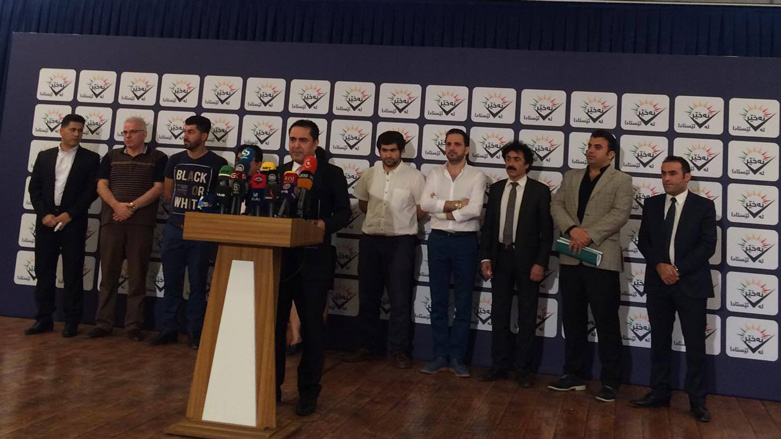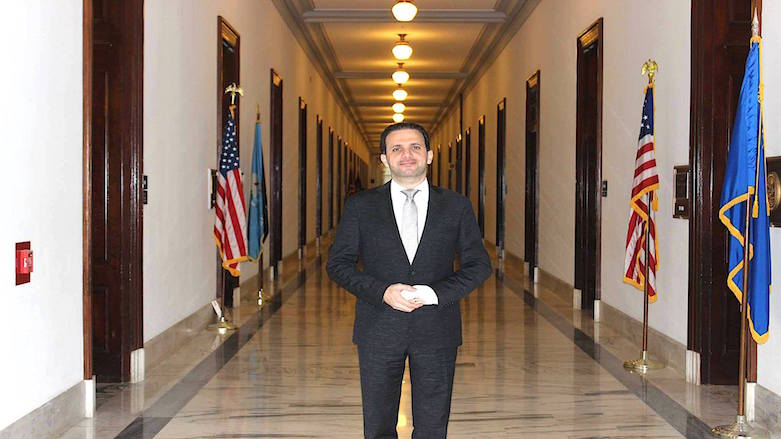Meet the campaigners behind the anti-Kurdistan referendum ‘No for Now’ movement

ERBIL, Kurdistan Region (Kurdistan 24) – On Tuesday, the controversial movement of "No for Now," which opposes the Kurdistan Region's referendum on independence, was officially launched and called for the postponement of the vote scheduled for Sep. 25, 2017.
President of the Kurdistan Region Masoud Barzani on June 7 met with representatives from every party in the Kurdistan Region, except for Gorran (Change) and Kurdistan Islamic Group (KIG) who boycotted the meeting. The leading parties decided to schedule a referendum on Sep. 25 for the Kurdistan Region to choose whether to secede from the rest of Iraq or not.
The decision was widely welcomed by most the Kurds in the Region and abroad. Independence has been a long-awaited dream for millions of Kurds who have sought to establish a state of their own since at least the end of World War I after colonial powers divided up the Middle East and divided their territory into what is modern-day Iraq, Syria, Turkey, and Iran.
While most Kurds and political parties recognize the upcoming referendum as a 'historic moment,' a campaign against the referendum was officially announced on Tuesday. It is being led by Shaswar Abdulwahid, a Kurdish businessman and the owner of a media conglomerate which includes NRT TV.
The anti-referendum campaigners will also broadcast its own television channel called ‘No for Now.' The movement's backers consist of Abdulwahid and certain Kurdish political party members and officials who are urging people to vote ‘No’ in the referendum, arguing the timing is "not suitable."
While Abdulwahid and his media outlets regularly target the Kurdistan Regional Government (KRG) on corruption, his corporation has received roughly US $40 million from the government and large swaths of land for housing and development projects in Sulaimani Province.
In the past years, shareholders of Chavi Land, a large amusement park in the Kurdistan Region owned by Abdulwahid, have protested the businessman’s failure to pay their dividends. The issue remains unsolved.
Former Kurdish Member of Parliament in Baghdad Sirwan Ahmed has previously charged that Nouri al-Maliki, former Prime Minister of Iraq was financing Abdulwahid’s corporation and using certain Kurdish media outlets to oppose the Kurdistan Region’s referendum.
Kurdish media outlets have previously published an official document from Maliki’s office confirming that the former had given US $87 million to Chavi Land, which is owned by Abdulwahid.
Maliki implemented staunchly Shia sectarian policies when he was in power, which experts say have largely contributed to the rise of the Islamic State (IS.) At the insistence of the US, Maliki stepped down in 2014 to become a vice-president of Iraq.
Indeed, in the past, several NRT presenters have resigned over the channel’s hostility toward Kurdish issues. Most recently, two others, Shwan Harki and Kajin Hassan, publicly announced their resignations to protest NRT’s opposition to the referendum.
The media outlet is often criticized by the people of the Kurdistan Region and Kurdish officials for having an agenda which strongly favors the Iraqi government and Iran over the KRG.
Speaking to The Washington Post, Abdulwahid stated his intent to form his own political party and run in the elections scheduled for November, in a bid to become Prime Minister of the Kurdistan Region.
Faruq Rafiq is another senior member of the campaign, an activist with Canadian citizenship. He was one of the Gorran supporters who participated and encouraged the Feb. 17, 2011 violent protest which resulted in the death of a number of civilians
Rafiq is well-known for his political flip-flops. He previously appeared on and contributed to Kurdistan Democratic Party (KDP), the largest party in the Kurdistan Region, affiliated media as well as Kurdistan Patriotic Union (PUK) associated outlets, and later contributed to Gorran-linked media.
Farhad Hama Salih, known as Farhad Sangawi, is a PUK member of Parliament in the Kurdistan Region. He was previously accused of illegally seizing shops in Sulaimani.
Similar to Rafiq, he is known for being an opportunist and switching parties to best serve his personal interests. Sangawi used to also be a famed PUK Radio personality in the 1980s.
Following the establishment of Gorran, he left the PUK and joined the party. After a short period of time, Sangawi returned to the PUK and became a member of the Kurdistan Region's Parliament. He was highly criticized by people for his successive changes of heart.
Despite the attention given to the anti-referendum campaign, the 'Yes' vote for independence for the Kurdistan Region is expected to win.
In 2005, an informal referendum was conducted in the Kurdistan Region alongside the parliamentary elections. The ‘Yes’ for independence won 98.9 percent of total votes.
Regarding the timing of the referendum, senior Kurdish officials have repeated that the people of the Kurdistan Region have been waiting for 100 years for the right to self-determination, asking those who claim Sep. 25 is not suitable, "if not now, then when?"
“Those who oppose the timing of the referendum might look at it from the perspective of their interests and benefits alone, not that of the people of the Kurdistan Region,” Masrour Barzani, the Kurdistan Region Security Chief, has previously said.

